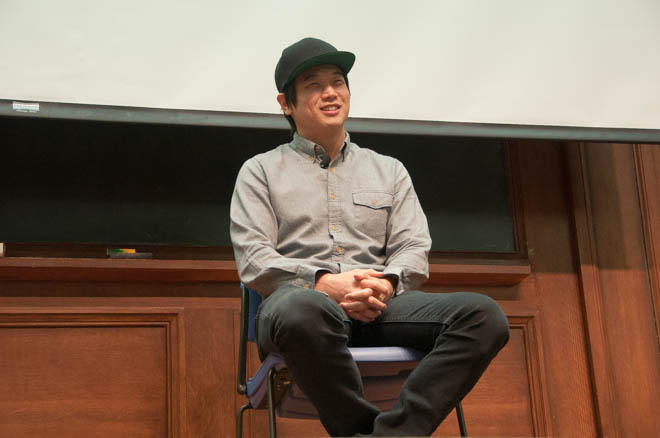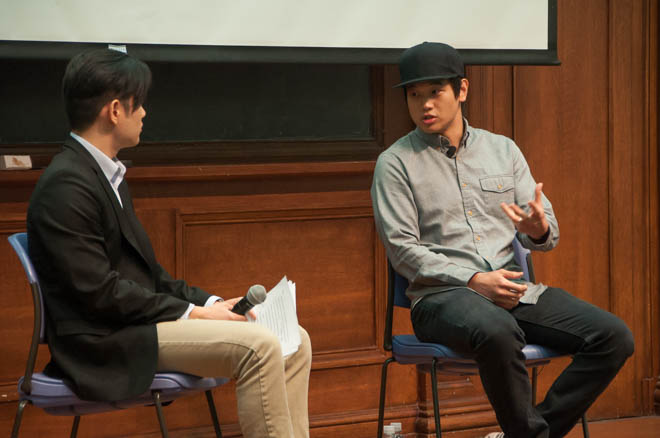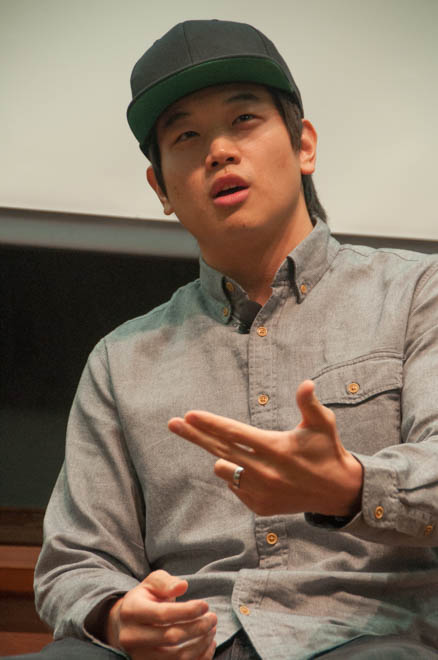Just when you are aMazed that there is still a month and a half left of school (#quartersystem), Ki Hong Lee shows up at Northwestern to remind you that you are Unbreakable.
The actor, known for his roles in The Maze Runner franchise, Unbreakable Kimmy Schmidt and various Wong Fu productions spoke at Harris Hall on Saturday afternoon. The event was sponsored by the Chinese Students Association and the Asian Pacific American Coalition and included a 30-minute Q&A moderated by Weinberg senior Leo Zhu followed by a 50-minute Q&A with the audience and a photo opportunity for those in attendance. Lee spoke about his transition into acting, his most recent roles and his experience as an Asian-American actor in Hollywood.
Lee was born in Korea, before transitioning to New Zealand and eventually Southern California. He studied psychology at UC Berkeley. It wasn’t until after college (during a gap before he had to start working at “Teach for America”) that he pursued his dream of becoming an actor.
Soon after he took a seat in front of a fully-packed auditorium at the event, Lee acknowledged the addition of the Asian-American Studies major to Northwestern’s curriculum and said that Asian-American studies classes are able to change world views. This introductory statement kicked off an evening of discussion about what it means to be Asian-American.
“I’ve always had a strong identity in the fact that I’m Korean-American,” Lee said. “Not just that I’m Korean, that I’m American, too.”
Regarding the topic of whitewashing in Hollywood, Lee said that it’s a significant problem, but not one that can be solved easily.
“The only way to change that is if you have writers, directors, producers, the whole gambit,” Lee said. “That’s gonna take time. It’s not gonna be overnight and it’s not gonna be next year or the year after. It’s gonna be a lot longer, but it starts with what people want.”
One of Lee’s most notable roles is Dong Nguyen from Unbreakable Kimmy Schmidt, a Vietnamese immigrant with whom the titular character falls in love. Lee said that he was initially scared of the role, as he didn’t want to “take Asians back 10 years.” However, he said that he felt like he was in good hands with series creators Tina Fey and Robert Carlock.
“He wasn’t the butt of the joke,” Lee said. “You make fun of him being an immigrant, but that’s just the same way you see Kimmy, because they share the same perspective. They’re taking in New York in the same way at the same time.”
With Minho, a character in The Maze Runner, Lee said that he felt like he “won the lottery,” thanks to the similarity of the character to himself.
“They wanted an Asian actor who is not a nerd or a stereotypical Asian geek,“ Lee said.
In 2014, Lee came in fourth place on People’s Sexiest Man Alive List. He said that while he hated the process at the time, looking back, he thinks it’s important for minorities to be on the list.
“When you go to the supermarket and you see a rack of magazines, you see all these pictures of good-looking people, like, ‘Dude, I don’t look like that,’” Lee said. “But imagine if you had minorities on those covers, and you look at those covers like, ‘Yeah, he looks just like me! I’m hot!’ If you think about it, it does change your psyche and the way you think about yourself and the way you perceive yourself in relations to others and I realized that that’s very important.”
One of the takeaways from the evening Lee emphasized was the importance to be proud of who you are and being the “best version of you that you can be.”


